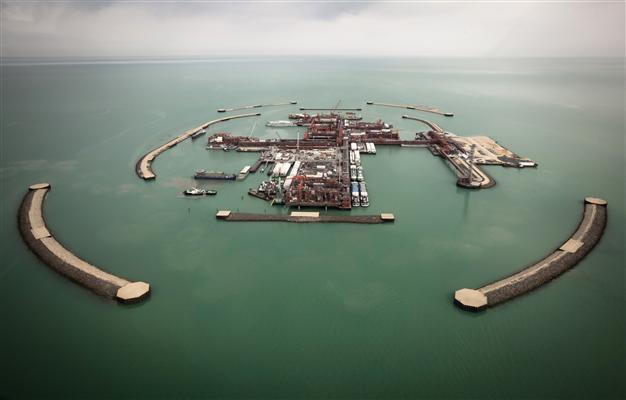Kazakhstan's Kashagan oilfield to start commercial output in 3-4 weeks
ASTANA - Reuters

REUTERS Photo
The giant Kashagan oilfield is set to launch long-delayed oil output within days, the Kazakh oil and gas minister said on Tuesday, meaning a consortium developing the deposit would avoid fines for missing an Oct. 1 production deadline.The multinational group developing the huge reservoir in the Caspian Sea off western Kazakhstan is estimated to have spent $50 billion in about 13 years, which makes the world’s biggest oil find in decades also the world’s costliest oil project.
The North Caspian Oil Company (NCOC), implementing the project in the harsh conditions of the freezing shallow sea, had several times shifted the deadline for production of the first oil from the field after missing the original 2005 target.
This year the final deadline was shifted to Oct. 1 from June, and the Kazakh authorities said they could refuse to recompense part of the project costs to consortium members if the first oil from Kashagan started flowing after September.
Sauat Mynbayev, head of Kazakh national oil and gas company KazMunaiGas, told reporters on Saturday that Kashagan would produce “test” oil on Sept. 9.
He said at the time that it would take between three weeks and one month to launch commercial output.
Oil and Gas Minister Uzakbai Karabalin told journalists on Tuesday that output of first oil had been postponed from Sept. 9. “We expect it (output) any day,” he said. “If everything is done on time, what penalty sanctions can there be?”
But a senior government official, who declined to be identified, told Reuters later on Tuesday: “Kashagan will be launched today.” He declined to elaborate.
Ambitious targets
Repeated delays in launching Kashagan have unnerved Kazakhstan, Central Asia’s largest economy with a population of 17 million, which had originally set an ambitious target of entering the world’s top 10 oil producers by 2015.
Kazakhstan, which holds 3 percent of the world’s recoverable oil reserves, plans to raise oil output to 83 million tons in 2014 from this year’s 82 million tons. Driven mainly by Kashagan, oil output is forecast to increase to 110 million tons in 2018.
Kazakh President Nursultan Nazarbayev, who has run the world’s ninth-largest nation by area for more than two decades, said Kazakhstan aimed to sustain stable oil and gas exports until 2050, which would replenish its vital oil fund.
“For our population and the state, it will be enough to produce 2 million barrels a day,” he told an economic forum.
On Sept. 7, Chinese President Xi Jinping and Nazarbayev oversaw the signing of an agreement between KazMunaiGas and China National Petroleum Corp (CNPC), which sealed China’s entry into the Kashagan project with an 8.33 percent stake.
The deal, estimated to be worth $5 billion, followed Kazakhstan’s decision in July to use its pre-emptive rights to buy an 8.40 percent stake from U.S. oil major ConocoPhillips in the field for a similar price.
ConocoPhillips said last year it had agreed to sell its stake to ONGC , the overseas arm of an Indian state-run company. Kazakhstan’s deal with CNPC dashed India’s hopes to enter the project.
KazMunaiGas head Mynbayev said after the deal with CNPC was signed that Kazakhstan planned to export its quota of crude from Kashagan via the pipeline of the Caspian Pipeline Consortium running to Russia’s Black Sea port of Novorossiysk.
He did not exclude, however, that Kazakhstan could export Kashagan oil to China via the existing Atasu-Alashankou pipeline to help feed its neighbor’s rising energy consumption.
During Kashagan’s development, production will gradually increase to 370,000 barrels per day in the second stage from 180,000 bpd in the first stage in 2013-14, according to NCOC.
KazMunaiGas, Italy’s ENI, U.S. major ExxonMobil, Royal Dutch Shell and France’s Total each hold 16.81 percent stakes in Kashagan. Japan’s Inpex owns 7.56 percent.
















